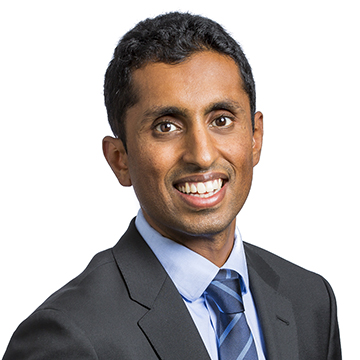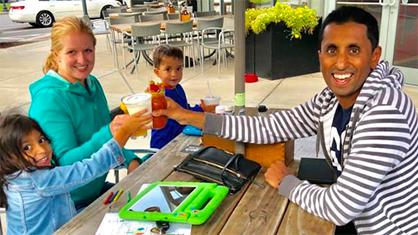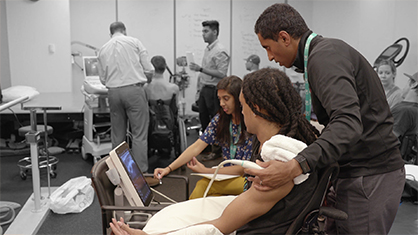Turning Collaboration into Career Advancement
KL2 Scholar Prakash Jayabalan brings team mentality to sports medicine
For Prakash Jayabalan, MD, PhD, Northwestern’s Multidisciplinary Career Development Program (KL2) has provided the connective tissue to move his career forward.
Jayabalan, assistant professor of Physical Medicine and Rehabilitation, became a KL2 Scholar in 2019 and has since pursued a research career focused on post-injury cartilage strength.
“I am so grateful for the learning opportunities that the KL2 program has awarded me so far,” says Jayabalan, who is also director of the Clinical Musculoskeletal Research at the Shirley Ryan AbilityLab. “My biggest moment of growth was coming to the realization that collaboration can further individual research careers as well as projects that change lives.”
The Northwestern University Clinical and Translational Sciences (NUCATS) Institute’s prestigious KL2 Program provides two years of dedicated mentorship, education, and career development opportunities while conducting translational, multidisciplinary, clinical research.

I was drawn to Physical Medicine and Rehabilitation because I collaborated with PM&R physicians who focused on individuals’ capability for recovery and I could see the potential impact of my research in the lab. ”
Jayabalan grew up in London, where he attended medical school at King’s College. He began his career as an orthopaedic surgery resident at Oxford, but had a moment of clarity during his sabbatical to undertake a PhD in Pathobiology at the University of Missouri. Suddenly he found himself in love with the non-operative treatment of musculoskeletal disorders.
“It was during my PhD training that I discovered through collaboration how much I loved Physical Medicine and Rehabilitation (PM&R),” says Jayabalan, who is also an Alliance for Research in Chicagoland Communities Steering Committee member. “I was drawn to the field because I collaborated with PM&R physicians who focused on individuals’ capability for recovery and I could see the potential impact of my research in the lab.”
After completing his PhD training, Jayabalan decided to stay in the U.S., to pursue PM&R, where he completed residency training at the University of Pittsburgh Medical Center, subsequently earning a fellowship in Sports Medicine at Northwestern University.
“When people think of sports medicine, they think of elite athletes like those in the NFL or NBA,” Jayabalan says. “However, those individuals are primarily a beacon to sports medicine — encouraging others to get outside and exercise. Helping everyone from the weekend warrior to the athlete with disabilities reclaim their physical strength through clinical care and research is what makes my work worth it.”/p>
As an assistant professor and KL2 Scholar, Jayabalan has shifted the focus of his research towards the development of a cartilage stress test to evaluate post-injury cartilage health. “The KL2 program has given me invaluable time with my faculty mentor to develop some of the biomechanical skills needed to achieve my long-term research goal of evaluating the metabolic state of cartilage. Being able to interact with leading clinician-scientists in a variety of fields has completely changed my view of the possibilities of research.”
When he isn’t examining knee joints or conducting clinical trials, Jayabalan enjoys running and has completed 6 marathons. He also loves soccer, particularly Chelsea Football Club, and being active with his wife and two children.
He expects to use the collaborative skills that he has honed through the KL2 program to further his research. “Above all else, it’s nice to be surrounded by other early career faculty who understand what it’s like to be in this stage of our medical work. KL2 is a community at its core, and learning from my peers is incredibly rewarding.”
Research reported in this publication was supported, in part, by the National Institutes of Health's National Center for Advancing Translational Sciences, Grant Number KL2TR001424. The content is solely the responsibility of the authors and does not necessarily represent the official views of the National Institutes of Health.
Written by Morgan Frost






